
Related
Guests
- Peter Hotezco-director of the Center for Vaccine Development at Texas Children’s Hospital and dean of the National School of Tropical Medicine at Baylor College of Medicine.
As COVID cases skyrocket, we speak to Dr. Peter Hotez at Texas Children’s Hospital about the Omicron surge, as well as his groundbreaking work developing an affordable patent-free coronavirus vaccine. Last week the Indian government gave emergency approval to the new low-cost, patent-free vaccine called Corbevax, which Hotez co-created. He says it could reach billions of people across the globe who have lacked access to the more expensive mRNA vaccines produced by Pfizer and Moderna. “We can really make a vaccine for the world,” says Hotez. Hotez also addresses problems stemming from ongoing vaccine hesitancy.
Transcript
AMY GOODMAN: The United States is now averaging over 400,000 new COVID cases a day as the Omicron variant rapidly spreads across the country. The record-breaking surge is putting a new strain on hospitals, even though early studies suggest Omicron infections appear to be milder than previous variants. In Washington, D.C., cases are up by 500% over the past two weeks. In Puerto Rico, cases are up nearly 1,000%. COVID cases are also rapidly rising globally with daily new cases surpassing 1 million for the first time as the pandemic enters its third year. In Argentina, nearly 30% of all COVID tests are coming back positive. In China, the city of Xi’an has entered a second week of lockdown. Cases in Australia have reached a new high.
We begin today’s show looking at vaccine inequity and efforts to vaccinate the world. Last week, the Indian government gave emergency approval to a new low-cost, patent-free vaccine called Corbevax. The vaccine was developed by two doctors at the Texas Children’s Hospital’s Center for Vaccine Development. An Indian company is now aiming to produce 1 billion doses of the vaccine this year to help address the massive shortage of COVID vaccines in the Global South.
We’re joined now by one of the vaccine’s creators, Dr. Peter Hotez, co-director of the Center for Vaccine Development at Texas Children’s Hospital. His most recent book, Preventing the Next Pandemic: Vaccine Diplomacy in a Time of Anti-science.
Dr. Hotez, welcome back to Democracy Now! Can you link the first part of our lede, what’s happening around the world with the speed of the Omicron variant, to what you have now just accomplished, making this patent-free vaccine available to the world? India has just given you emergency approval.
DR. PETER HOTEZ: [inaudible] the year of 2021 [inaudible] States from the Delta and Omicron variant. The reason they arose was because we allowed large unvaccinated populations to go unvaccinated in low- and middle-income countries.
AMY GOODMAN: Can you repeat what you said at the beginning, Dr. Hotez? We didn’t quite get it, and it’s absolutely critical.
DR. PETER HOTEZ: Well, thanks again for having me. Again, the reason why we have this situation now with Omicron, just like we have the situation with Delta, is we allowed large unvaccinated populations in low- and middle-income countries to remain unvaccinated. Delta arose out of an unvaccinated population in India in early 2021, and Omicron out of a large unvaccinated population on the African continent later in the same year. So, these two variants of concern represent failures, failures by global leaders to work with sub-Saharan Africa, Southeast Asia and Latin America to vaccinate the Southern Hemisphere, vaccinate the Global South.
And we got tired of it, so we’ve decided to do what we’ve always done for 20 years. And when I say “we,” myself and Dr. Bottazzi, as you point out, and our team of 20 scientists. We make vaccines for diseases that the pharma companies won’t make, for parasitic infections such as Chagas disease and schistosomiasis. And we adopted a coronavirus program about 10 years ago, and then we flipped that around to make the COVID vaccine.
And the only thing we know how to do is make low-cost, straightforward vaccines for use in resource-poor settings. And that was the failure of the global policy leaders. They never had any interest in that. It was always about speed and innovation and to make enough interesting vaccines for North America and Europe, without any attention to the rest of the world. So, we went the opposite direction. And we worked really hard, because, you know, it was very difficult to get funding. We got no support from Operation Warp Speed, no support really from the G7 countries. We were on our own.
And now we’ve licensed our prototype vaccine, and help in the co-development, to India, Indonesia, Bangladesh and now Botswana. And India is the furthest along, and we’ve worked with this extraordinary organization known as Biological E that has got a track record of making low-cost vaccines for the world. And we’ve partnered with them, working with them on a daily or weekly basis. And now that vaccine is being produced by Biological E, and they already have 150 million doses ready to go. And they’re now producing 100 million doses a month, and that will get us to 1.2 billion. We’re going to need several billion more, and hopefully our other partners in Indonesia, Bangladesh and Botswana will also have similar successes.
So, it’s really exciting to show that, you know, you don’t need to be a multinational pharmaceutical company and just make brand-new technologies that will only be suitable for the Northern Hemisphere. We can really make a vaccine for the world. And that’s what our goal has always been for the last 20 years. And we think we’ve made an important first step with COVID-19.
AMY GOODMAN: Public Citizen has said, quote, “Texas Children Hospital’s commitment to sharing technology is a challenge to the pharma giants and the false narrative that vaccine production and medical innovation thrive through secrecy and exclusivity. If Texas Children’s Hospital can do it, why can’t Pfizer and Moderna?” Can you talk about how you were able to do this with so little funding while they are making billions, not to mention billionaires of their founders and chairs and execs in the companies, while millions now — we are dealing with the largest surge in the history of this pandemic?
DR. PETER HOTEZ: Well, you know, the way I look at it is, the multinational pharma companies are the multinational pharma companies. They’re going to do what they do. And they’ve made some good vaccines. And I, myself, was the beneficiary of the Pfizer-BioNTech vaccines.
I think the problem was not balancing that — not balancing the ecosystem, putting all of the eggs in the pharma basket and not recognizing that we have some outstanding vaccine producers in low- and middle-income countries that are bereft of resources and bereft of some of the technical help they need to get over that hump. And that’s what we’ve been doing now for the last 20 years. The other thing we do is we build capacity. We invite scientists from all over the world to come into our vaccine labs to learn how to make vaccines under a quality umbrella, whereas you cannot walk into Merck or GSK or Pfizer or Moderna and say, “Show me how to make a vaccine.” With our group, we can. And so, we think the problem is not balancing that model better. And that’s what we’re doing now.
And I think, for me, the biggest frustration was never really getting that support from the G7 countries. So, not only was I going on cable news networks and talking about the disinformation empire that was building out of the White House in 2020, but trying to raise meager funds just to get started. And fortunately, we were able to get some funding through Texas- and New York-based philanthropies, and that made — that, we raised about $6 [million], $7 million, I believe. And with that, we were able to pay our scientists to actually do this, transfer the technology, no patent, no strings attached, to India, now, as I said, Indonesia, Bangladesh and Botswana. And, you know, of course, we’ve been getting calls for help all over the world from ministries of science and ministries of health, and we do what we can. We could do a lot — I mean, if we had even a fraction of the support that, say, Moderna or the other pharma companies had gotten, who knows? We might have been able to have the whole world vaccinated by now.
AMY GOODMAN: I mean, this point you raise with Moderna, which got a fortune from U.S. taxpayers — I mean, we’re talking about millions, if not a billion, dollars — to do the research to develop this, and yet they are not willing to share the formula.
DR. PETER HOTEZ: Here was the problem. The problem was the policymakers, not only in the U.S. but globally, were so fixed on speed and innovation. You know, it was all about the brand-new technologies, rapidly immunizing populations, without that situational awareness to understand that when you only rely on a brand-new technology, there’s a learning curve. We need 9 billion doses of vaccines for sub-Saharan Africa, Latin America and Southeast Asia. Nobody was able to take a step back and — as any first-year engineering graduate student will tell you, well, you can’t go from zero to 9 billion with a new technology right away; you’d better balance it with some older traditional technologies. And that was the frustration that we had, that there wasn’t — we couldn’t persuade the big policymakers that that was the way to go, in addition to what they were doing.
Fortunately, we were able to do it. We could have done it a lot faster had we had more support. But now we’re moving forward. So, India, as I said, is now starting to vaccinate its population. They’re working to donate vaccines to the COVAX sharing facilities. We’ll do it with others. And eventually, we think we can vaccinate the Southern Hemisphere, the Global South, and prevent these future variants from emerging.
But, you know, we’re still not getting that kind of awareness. You know, for instance, President Biden — and I’m a big fan of the team that the Biden administration has brought on — boasted that, a couple of weeks ago, right before the new year, that he donated 275 million doses to 110 countries. Well, heck. I mean, we have already matched that with our research institute in Texas, and we’re about to exceed it.
So, I think we really need the G7 countries to step up in a bigger way, and we think we could help them quite a bit with our technology. It looks really robust, same technology used to make the recombinant hepatitis B vaccine that’s been around for 40 years, great levels of virus-neutralizing antibody, durable, simple refrigeration, actually has one of the best safety — maybe the best safety profile of any of the COVID vaccines.
And now we’re are doing clinical trials in kids. So, the emergency use is for adults, but hepatitis B vaccine has been given to infants for decades. Ours is the same technology. We’re doing now step-down studies in kids. So we’re hoping that could be the vaccine to immunize kids all over the world, as well. The one thing we don’t have is a path for the U.S., because we don’t have a U.S. partner.
AMY GOODMAN: So, what exactly does that mean? I mean, you’re the Baylor Texas Children’s Hospital. The vaccine is called Corbevax. Can you explain the older technology? I mean, Johnson & Johnson also used an older technology, and now it is not as effective as the Moderna and Pfizer. Can you talk about that and how your vaccine exactly works?
DR. PETER HOTEZ: Well, again, the Johnson & Johnson is an adenovirus vector technology. That’s never been used before to make a vaccine in anything near this scale. So, in that sense, the adenovirus technology is a new technology. Ours is truly an old-school technology that’s been used to make recombinant hepatitis B vaccine. It’s microbial fermentation in yeast. It’s even a vegan vaccine, which is kind of interesting. So, now our partners in Indonesia who are scaling it up are trying to do this as a halal vaccine for Muslim-majority countries, which is pretty exciting, as well.
And as I said, you know, what we do is we license the technology, and we provide the prototype, production cell bank, no strings attached, no patent. We help in the co-development. And then the countries themselves and those companies own it. So Corbevax is the one for India, owned by Biological E. They work out the clinical development plan with the Indian regulators and the World Health Organization. We’re hands-off. We don’t try to meddle into their business. You know, very much we are a believer in this concept of decolonization. There’s too many colonial trappings around trying to own technology and dictate to the Global South what to do. And for us, that’s quite abhorrent. So we do this without strings attached. Once we do our due diligence that we know it’s a vaccine producer that has a track record of producing vaccines for the world, then we hand it off to them and help them in any way we can, again, at our own expense. We help them with the assays. So it’s no cost to the developing country vaccine manufacturers, who actually call themselves that, the developing vaccine — Developing Country Vaccine Manufacturers’ Network.
AMY GOODMAN: Well, I want to ask what you mean when you say a vegan vaccine or a halal vaccine. How are the others not?
DR. PETER HOTEZ: Well, the others use either — often use mammalian cells in some aspects of the process. It’s not that it’s better or worse. It’s just that ours has no animal products in our vaccines. And that makes it a little more straightforward for a country, especially for some of the Muslim-majority countries that worry about whether a vaccine is halal or not.
AMY GOODMAN: Let me go to Dr. Fauci. This goes to the whole issue of last week the Centers for Disease Control reducing the recommended isolation time for people with asymptomatic infections to five days down from 10. On Sunday, Dr. Fauci appeared on ABC’s This Week and said the CDC is considering updating the isolation guidance after facing widespread criticism.
DR. ANTHONY FAUCI: You’re right there has been some concern about why we don’t ask people at that five-day period to get tested. That is something that is now under consideration. The CDC is very well aware that there has been some pushback about that. Looking at it again, there may be an option in that that testing could be a part of that. And I think we’re going to be hearing more about that in the next day or so from the CDC.
AMY GOODMAN: In our next segment, we’re going to be talking more about testing. But this atrocious lack of testing in the United States makes it impossible for there to be a kind of sane approach to all of this. But the fact that the CDC said people could come back to work, which in some cases workers — the employers then require workers to come back to work after five days, without a test, your response to this?
DR. PETER HOTEZ: Yeah, as Tony points out, as Dr. Fauci points out, that they’ll probably have to walk that back partly and do an antigen-based test. Look, this was a tough call for the CDC, as well. I think the Omicron variant, which is just so overwhelming and so disruptive because of its high transmissibility, almost as high as measles — were trying to balance what they know about the science with the fact that right now we have to keep our society functioning at some level.
The biggest concern, of course, is all the healthcare providers getting knocked out of the workforce because they’re at home with COVID, and that creates a dangerous situation. And we heard all weekend about the problems with the airlines and the fact that ground crews are absent, air traffic controllers are absent.
So, one of the — you know, each variant has its own unique attributes or its own what I call little shop of horrors. In the case of Omicron, it’s this credibly high transmissibility, that could be so disruptive socially in maintaining a society as we know it. So I think the CDC was trying to balance what makes sense scientifically with the reality of trying to keep the country functioning. I actually don’t fault them as much as others do. Yes, I think they probably should have had the antigen test added on afterwards, but, you know, it’s tough when you’re in the middle of a firestorm to always get it perfect the first time around.
AMY GOODMAN: And can you talk about children — I mean, after all, you are at Texas Children’s Hospital — the enormous number of children who are now coming down with COVID, but how seriously are they being affected?
DR. PETER HOTEZ: Well, I think there’s two aspects to this. First of all, we saw this a little bit with the Delta variant here in the South, in Texas, over the summer, that it was much more transmissible than previous lineages, and kids were getting swept up in it. It wasn’t because Delta was selectively targeting kids. And I think that’s probably true of Omicron, as well. When you have something this transmissible, a lot of kids are getting infected.
And what you’re seeing are two types of hospital admissions. So, first of all, I think there are some kids who are getting admitted for various conditions, and upon testing, routine testing for hospitalization, they’re found to be positive. So they may be actually asymptomatic for their COVID but found to be positive. And I think that’s part of the hospitalizations. The other are, there are kids who are genuinely sick from COVID-19, and a lot of younger kids, as well. And now that schools are opening, especially in the North, where transmission is so high, we should expect that trend to continue.
And again, it’s going to be that one-two punch of having kids hospitalized and healthcare workers in pediatric hospitals at home because they’re ill from COVID or found to be positive. And I think that’s the — for me, that’s the dangerous situation with COVID-19. Yes, it looks like, overall, the virus may produce less severe disease, but still enough to cause a pretty steep rise in hospitalizations. We’re seeing a 50 to 60% rise in hospitalizations in New York and Washington, D.C., and having that healthcare workforce unable to adequately take care of those hospitalized individuals. One thing that we’ve learned during the last two years of this pandemic is when ERs, emergency rooms, in pediatric ICUs or ICUs get overwhelmed, that’s when mortality really skyrockets. And that’s the danger point that we are with COVID-19, on top of the fact that two of our three monoclonal antibodies do not work for the Omicron variant, and we don’t have enough of that third one. Paxlovid is still not here in abundance, so we have to rely on remdesivir, that has to be given parenterally. It doesn’t work quite as well as Paxlovid. And as we started at the beginning, the diagnostic testing is still a debacle.
So, when you put all of that stuff in the mix, you’ve got a very dangerous epidemic here in the United States in the month of January. And, of course, this brings us back to how we started our whole conversation, which is, all of this was predicted and predictable and preventable had we showed greater resolve to vaccinate the world, especially the world’s low- and middle-income countries.
AMY GOODMAN: Finally, you tweeted, “Since June … 2021, … 200,000 unvaccinated Americans lost their lives [due] to Covid … despite … widespread availability” of vaccines. Two hundred thousand Americans needlessly died because they believed disinformation from the far right, you tweeted. However, vaccine hesitancy seems to span the political divide, with left-leaning parents, some refusing to vaccinate themselves or their kids. Your message to those who think vaccines are a profit-making mechanism for Big Pharma that will pollute their bodies and irreversibly alter their immune system’s natural responses?
DR. PETER HOTEZ: Well, the first part may be true. Vaccines clearly have been profitable for Pfizer and Moderna, but it doesn’t mean that — but they can still save your life. So I think that that’s the message. And we’ve seen that of those 200,000 Americans who’ve died since June 1, we now know that 85% were unvaccinated, the other 15% split between partially vaccinated and a few full vaccinated, especially if they were immunocompromised or of extremely high age. But, overwhelmingly, it’s the unvaccinated who are losing their lives.
And, overwhelmingly, that is coming from an aggressive campaign of disinformation, what I call anti-science aggression, coming from the conservative news outlets, coming from the members of Congress. You talked about Congresswoman Marjorie Taylor Greene just being taken off Twitter. That’s in part because she’s been out there at the CPAC conference and elsewhere discrediting vaccines, she and her colleagues. So we have about a half a dozen members of the U.S. Congress going out of their way to discredit the safety of vaccines, even saying they’re political instruments of control, or ridiculous things like, “First they’re going to vaccinate you, and then they’re going to take away your guns and your Bibles.” And as absurd as that sounds to us, there’s a fourth of the country that actually believes it, and those are the ones who are not getting vaccinated. And we even have far-right think tanks to give these far-right groups intellectual cover, academic cover. So, this is a whole ecosystem coming from political extremism on the far right, and it’s a killer. I’ve written an article called “Anti-science kills,” because now it’s killed 200,000 Americans since last June.
AMY GOODMAN: Well, Dr. Peter Hotez, I want to thank you for being with us, co-director of the Center for Vaccine Development at Texas Children’s Hospital, just came up with a vaccine that is being made available patent-free to the world. Dr. Hotez’s latest book, Preventing the Next Pandemic: Vaccine Diplomacy in a Time of Anti-science.
Coming up, as the nation faces a massive shortage of rapid COVID tests, we’ll speak to a scientist who developed an inexpensive rapid test nearly two years ago, but the FDA wouldn’t approve it. Stay with us.

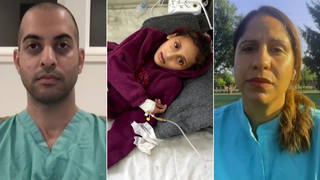
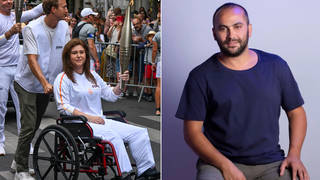

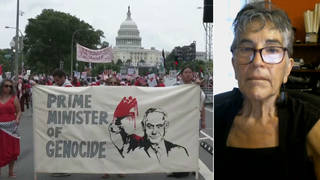

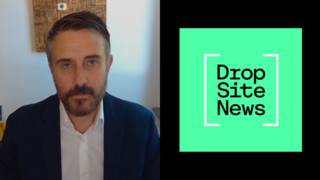
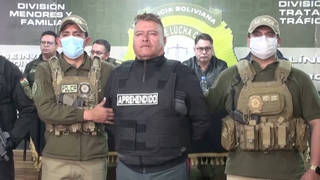
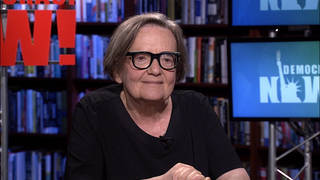

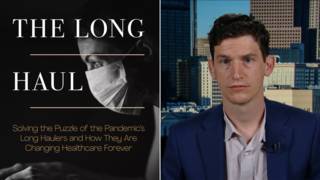



Media Options